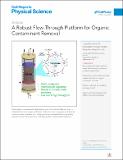A Robust Flow-Through Platform for Organic Contaminant Removal
Author(s)
Chen, Long; Alshawabkeh, Akram N; Hojabri, Shayan; Sun, Meng; Xu, Guiyin; Li, Ju; ... Show more Show less
DownloadPublished version (2.829Mb)
Publisher with Creative Commons License
Publisher with Creative Commons License
Creative Commons Attribution
Terms of use
Metadata
Show full item recordAbstract
© 2020 The Authors Achieving the greatest cleanup efficiency with minimal footprint remains a paramount goal of the water treatment industry. Toxic organic compounds threaten drinking water safety and require effective pretreatment. Hydroxyl radicals produced by the Fenton process (Fe2+/H2O2) destroy organic contaminants based on their strong oxidation potential. An upgraded reaction using solid catalysts, referred to as the Fenton-like process, was recently adopted to avoid the ferric sludge generation during the conventional Fenton process. However, most heterogeneous Fenton-like catalysts operate optimally at pH 3–5 and quite weakly in near-neutral water bodies. Here, we evaluate the feasibility of an electrolytically localized acid compartment (referred to as the Ella process) produced by electrochemical water splitting under flow-through conditions to facilitate the Fenton-like process. The Ella process boosts the activity of an immobilized iron oxychloride catalyst >10-fold, decomposing organic pollutants at a high flow rate. The robust performance in complex water bodies further highlights the promise of this platform.
Date issued
2021Department
Massachusetts Institute of Technology. Department of Nuclear Science and Engineering; Massachusetts Institute of Technology. Department of Materials Science and EngineeringJournal
Cell Reports Physical Science
Publisher
Elsevier BV